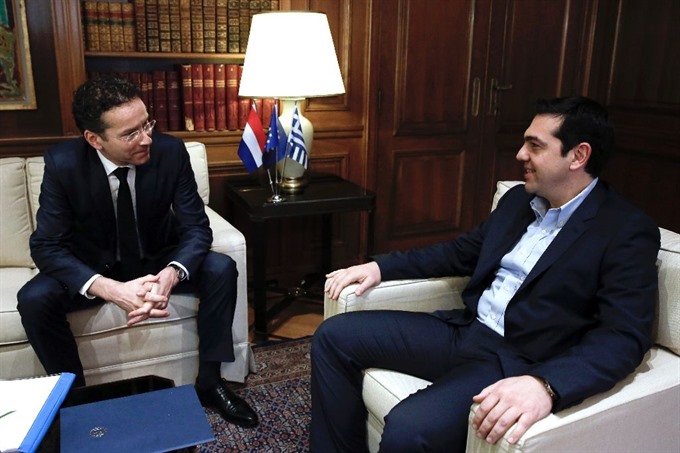 World
World

Greek lawmakers on Thursday approved a pension handout that has set the country on a collision course with hardline European creditors who accuse the struggling eurozone member of defiance.
 |
| A spokesman for Eurogroup head Jeroen Dijsselbloem, seen in 2015 with Greek Prime Minister Alexis Tsipras, said the eurozone was suspending the recently announced debt relief scheme for Athens in retaliation at not being fully briefed on handout plans. —AFP/VNA Photo |
ATHENS — Greek lawmakers on Thursday approved a pension handout that has set the country on a collision course with hardline European creditors who accuse the struggling eurozone member of defiance.
A total of 196 lawmakers out of 257 present from across the party divide approved the bill deepening a row that has also brought simmering EU disputes over austerity to the fore.
The handout measure, announced by leftist Greek Prime Minister Alexis Tsipras last week, earmarks 617 million euros (US$656 million) for a one-off payment to poor pensioners.
Athens says the pension handout will come out of a one-billion-euro tax surplus, but European creditors on Thursday said the Greek move raised "significant concerns on both process and substance" regarding the country’s bailout obligations.
No ’blackmail’
In the joint statement, representatives from the European Central Bank, the European Commission and the European rescue fund said they would now decide whether to uphold a Eurogroup decision granting Greece short-term debt relief earlier this month.
Tsipras on Thursday said as he arrived for an EU summit in Brussels that the situation had to be resolved "without blackmail" on the part of Greece’s creditors.
"I believe that we can have a breakthrough without blackmail and with respect of the sovereignty of each country," said the leftist leader, who fought with his European peers to within an inch of taking Greece out of the euro last year.
Germany "is the only country, the only eurozone finance ministry, that raises an issue," he told reporters, adding that halting the debt relief "is outside the borders of reason".
The issue will inevitably come on the agenda later today when Tsipras meets German Chancellor Angela Merkel for talks in Berlin.
After the EU summit Merkel said "a critical discussion has already begun" on the matter, but insisted "it is not my intention to negotiate with Greece about the Greek package" leaving that to the finance ministers.
France weighed into the debate with uncharacteristic force, led by President Francois Hollande who insisted that Greece be "treated with dignity" in the ongoing dispute.
A spokesman for Eurogroup head Jeroen Dijsselbloem on Wednesday said the eurozone was suspending the recently-announced debt relief scheme for Athens in retaliation at not being fully briefed on Tsipras’s handout plans -- which also include a lower sales tax for Greek islands sheltering migrants.
The actions "of the Greek government appear to not be in line with our agreements," said the spokesman for Dijsselbloem, who heads the 19-nation eurozone, which oversees Greece’s massive 86-billion euro bailout.
The dispute escalated within hours, with both French Finance Minister Michel Sapin and European economic affairs commissioner Pierre Moscovici --himself a former French finance minister -- publicly distancing themselves from the Eurogroup decision.
Under the bailout agreed with eurozone countries, Greece has committed to making a host of economic reforms and must submit to oversight of its budgets and spending plans.
Tsipras has also announced a sales tax benefit for islands sheltering thousands of migrants. This measure is to be discussed by parliament next week. — AFP




